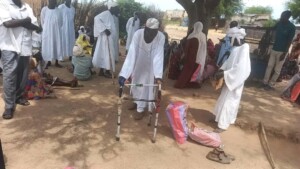‘Cholera in Sudan’s El Gedaref requires urgent intervention’
More than 60 new cases were reported in El Gedaref on Saturday. One patient died. The World Health Organization is supporting Sudan’s Health Ministry to contain the “acute watery diarrhoea” epidemic in the country.
A cholera patient died and more than 60 new cases were reported in El Gedaref on Saturday. In Khartoum North, new cases were recorded as well. The World Health Organization (WHO) is supporting the Sudanese Ministry of Health to contain the “acute watery diarrhoea” epidemic in the country.
In the area of El Gash in eastern Sudan’s El Gedaref state, one patient died of cholera on Saturday, and at least 30 new cases appeared, a medical source reported to Radio Dabanga.
More than 20 cases were recorded in El Rahad locality, and 10 in Wasat El Gedaref locality.
“The situation in El Gedaref requires urgent intervention. El Gedaref state must declare an epidemic and call for the WHO to intervene,” he said.
Khartoum
The Elbanjadeed Hospital in the densely populated El Haj Yousif district in Khartoum North received 14 new cases of cholera over the weekend.
“Three of them are children coming from the area of Abudeleig,” a medic reported from the hospital. “The total of cholera patients being treated here at the moment are 22.”
The UN Office for the Coordination of Humanitarian Affairs (OCHA) in Sudan reported in its latest bulletin that the federal Ministry of Health and WHO are working together to contain the spread of cholera – called “acute watery diarrhoea” by the Sudanese authorities.
OCHA said that WHO has deployed a national epidemiologist to follow-up on the “acute watery diarrhoea” outbreak in Khartoum. Four main hospitals in Khartoum were visited jointly by the Ministry and WHO to identify immediate gaps and address health service provision through treatment centres.
Response has been scaled up through engaging all sectors, civil society and NGOs, including media, with support from WHO, the UN Children’s Fund (Unicef) and the Sudanese Red Crescent Society, to implement interventions such as ensuring safe water, early detection, case management, health education and sanitation.
WHO and the Health Ministry are planning to launch community-based actions in order to enhance self-reliance of the affected communities and ensure the prevention of the disease in a more sustainable manner.
White Nile state
In White Nile state, where many areas were affected by “watery diarrhoea” in the past months, Unicef and partners have supported the treatment of more than 4,000 suspected cases, and provided lifesaving water supplies to about 800,000 people at risk.
A pilot training on community-based actions will be launched in White Nile state on 21 and 22 June. In addition, WHO has launched an early warning alert and response system in camps hosting South Sudanese refugees to quickly identify potential outbreaks and any other health threats, and provide an effective and rapid response, OCHA stated.
South Kordofan
On Sunday, a medical source told Radio Dabanga from the Hospital of Delling that the hospital's isolation ward received two new patients on Friday and Saturday. “One of them was in a very poor condition and died the same day, while the other is recovering.”
Cases of cholera have decreased in El Tadamon locality. A medical source told Radio Dabanga from El Tadamon’s Baloula that the isolation centre has received only two cases in the past two weeks.
He pointed to the vast spread of dysentery in the area owing to the presence of huge numbers of flies.
OCHA reported that the Sudanese Ministry of Health, supported by WHO, successfully carried out a cholera vaccination campaign for refugee and host communities in Abu Jubaiha and El Leri localities.
Darfur
The number of cholera patients at the Naivasha camp for displaced people near Shangil Tobaya in North Darfur’s Tawila locality seems to be decreasing as well.
On Sunday, a staff member of the camp’s health centre told Radio Dabanga that they received 11 new cases that day, compared to an average of 50 cases a day in the previous days.
“There are now 16 patients being treated in the isolation unit, including a patient from Um Dereisaya near Tabit” he said. “Fortunately medicines are available in large quantities.”
“The North Darfur Health Minister, the commissioner of Tawila, and a tribal chief visited the camp last week,” the medic added.
Follow #CholeraInSudan, #ألكوليرا_السودان











 and then
and then